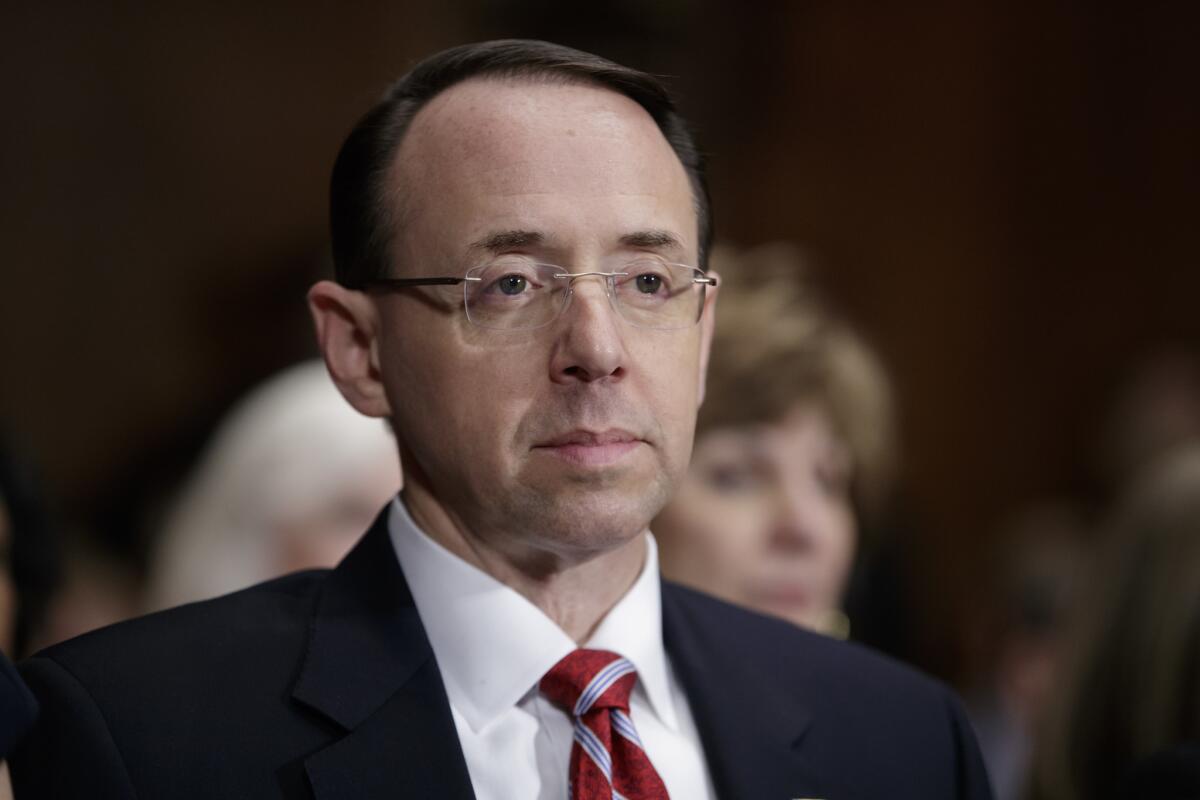Meet Rod Rosenstein, the deputy AG tied to Comey’s firing

- Share via
Normally the deputy attorney general has a low public profile, but even before he played a role in the firing of FBI Director
Atty. Gen.
Rosenstein, a veteran prosecutor who had been serving as the U.S. attorney for Maryland, was confirmed as the No. 2 by the Senate the following month.
That put him in charge of the investigation into whether current or former aides to
What is Rosenstein’s role in the Russia probe?
It will fall to Rosenstein to decide whether to file criminal charges against any of Trump’s aides, to drop the case entirely or to hand it off to an independent prosecutor.
At his Senate confirmation hearing March 7, Rosenstein refused to say whether he would be willing to bring in a special counsel, saying he wouldn’t make judgments in advance.
But he said he had “no reason to doubt” the conclusions of U.S. intelligence agencies that Russian authorities sought to influence the presidential race. He also said he believed the
Feinstein: Rosenstein's memo on Comey reads like a 'hastily assembled' political document »
What was his role in the Comey firing?
Rosenstein laid out the case for Comey to be removed in a three-page memo that the White House released Tuesday.
In firing Comey, Trump had said he acted on Rosenstein’s recommendation.
In a memorandum to Sessions, Rosenstein harshly criticized Comey for actions going back to last July, when he held a news conference to announce that the FBI would not seek charges against presidential candidate and former Secretary of State
That was a serious misjudgment, Rosenstein wrote, adding, "The goal of a federal criminal investigation is not to announce our thoughts at a press conference."
He went on to say that Comey had made the problems worse with his decision to disclose in late October — 11 days before the election — that the FBI had reopened its investigation of Clinton after finding State Department emails on a computer belonging to former Rep.
Reports have since come out that Rosenstein threatened to resign over the way the Comey dismissal was attributed in part to the memo.
What else does Rosenstein do?
As Sessions’ top deputy, Rosenstein is responsible for using Justice Department resources to step up enforcement of immigration laws, a Trump administration priority.
Sessions already has instructed all U.S. attorney’s offices to be more aggressive about filing criminal charges against people who cross the border illegally, and he has threatened to cut off department grants to so-called sanctuary cities unless they cooperate with immigration agents.
[Sessions] picked someone who grew up in the department and knows how cases are decided, and should be decided.
— Jamie Gorelick, deputy attorney general from 1994-1997
How did he become deputy attorney general?
The Senate voted overwhelmingly last month to confirm Rod J. Rosenstein as the No. 2 official at the Justice Department.
Rosenstein, 52, won unusual bipartisan support on the strength of his crime-fighting efforts as the U.S. attorney for Maryland for the last 12 years. He was confirmed as deputy attorney general by a vote of 94 to 6.
Where did he get his start?
Rosenstein has spent 27 years at Justice, getting an early job as a senior aide to a deputy attorney general. As a U.S. attorney, he supervised a broad range of criminal prosecution.
He first was nominated to the post by President George W. Bush. President Obama kept him on after the Senate did not move on Bush’s previous nomination of Rosenstein for a seat on a federal appeals court.
In the 1990s, Rosenstein worked on the independent counsel investigation of President Clinton and Hillary Clinton for their investments in a failed real estate company known as Whitewater.
Rosenstein was involved in separate questioning of both Clintons, who never were charged with a crime. More than a dozen others were charged and convicted, including the governor of Arkansas.
Jamie Gorelick, who served as deputy attorney general from 1994 to 1997 under the Clinton administration, praised Rosenstein at a recent ethics conference.
She said the department would remain in experienced hands. Sessions “picked someone who grew up in the department and knows how cases are decided, and should be decided,” she said.
Sign up for Essential California
The most important California stories and recommendations in your inbox every morning.
You may occasionally receive promotional content from the Los Angeles Times.








